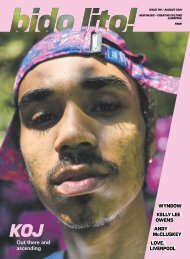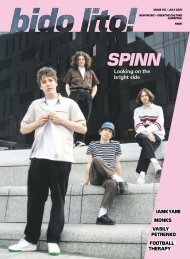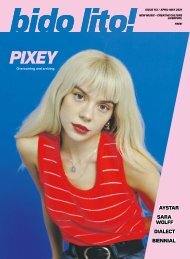Issue 104 / October 2019
October 2019 issue of Bido Lito! magazine. Featuring: STRAWBERRY GUY, MARVIN POWELL, COMICS YOUTH, RICHARD HERRING, BRADLEY WIGGINS, ENNIO THE LITTLE BROTHER, EDWYN COLLINS, SKELETON COAST, WAND, FUTURE YARD and much more.
October 2019 issue of Bido Lito! magazine. Featuring: STRAWBERRY GUY, MARVIN POWELL, COMICS YOUTH, RICHARD HERRING, BRADLEY WIGGINS, ENNIO THE LITTLE BROTHER, EDWYN COLLINS, SKELETON COAST, WAND, FUTURE YARD and much more.
Create successful ePaper yourself
Turn your PDF publications into a flip-book with our unique Google optimized e-Paper software.
My friend, Alireza Nassimi was a swan, a black swan.<br />
He lived a hermitic life and died a death of absolute<br />
loneliness. Alireza and I were in an unrequited love<br />
for Shiraz, that behemoth Narcissus. Shiraz did<br />
not like its admirers, its poets. It was a Jerusalem who stoned<br />
its messengers. So, we pined away until all that remained of us<br />
were our voices, our poems. Alireza went west, and I went to the<br />
West. He went to Qalat,<br />
a village near Shiraz,<br />
and in a sleety night<br />
overdosed, after he gave<br />
his manuscripts to fire.<br />
For seven years<br />
after my friend’s death<br />
in a ravine in Qalat, a<br />
village near Shiraz, my<br />
throat was occluded<br />
with a morsel of grief,<br />
but all my efforts to<br />
make him a garland<br />
with my words were<br />
doomed to failure. My<br />
overpowering grief was<br />
intermingled with a<br />
fear that what I would<br />
produce might well be<br />
prone to become, in Tennyson’s words, a “sad mechanic exercise<br />
in measured language” (In Memoriam).<br />
My migration to England took place some six years after<br />
Alireza’s translation into the netherworld. Maybe I was like H.<br />
D.’s Helen, who “need[ed] peace and<br />
time to reconstruct the legend” (Helen in<br />
Egypt). I finally found the peace, time, and<br />
breath I needed, in Liverpool, where my<br />
prenatal silence of travelling in the dark of<br />
a shipping container ended, and I opened<br />
my eyes to a different world.<br />
In September 2018, a wooden wall<br />
which separates a construction site from<br />
a pavement at Great George Street in<br />
Liverpool was covered with a long list of<br />
34,361 documented deaths of asylum<br />
seekers, refugees and migrants who had<br />
lost their lives within or on the borders of<br />
Europe since 1993 “due to the restrictive<br />
policies of ‘Fortress Europe’” I found<br />
myself several times standing in front of<br />
that list of many fates, gawping at the<br />
names, ages, regions of origin and causes<br />
of deaths. The list was a frame containing<br />
a myriad of stories; stories of us,<br />
stowaways and steerage passengers of<br />
the world. It was a memorial to poverty,<br />
as opposed to “a memorial to money”<br />
which is what Robert Hampson calls St<br />
George’s Hall in Seaport.<br />
It did not take someone more than<br />
a week to come and daub ‘INVADERS<br />
NOT REFUGEES!’ on the list. I<br />
could not thank the unknown<br />
hatemonger enough, for they<br />
made me rethink a key concept in<br />
an epiphanous moment. I loosely<br />
translated the three English words<br />
in my mind and came up with a<br />
slogan in Persian: “MOHAJEM<br />
NA MOHAJER!”. I told myself, “let<br />
me see things through their eyes.<br />
They are the ghost defenders of<br />
the city. Their monolithicity is at<br />
stake. What if I, a man of colour,<br />
a writer of scripts that look like<br />
scribbles in their eyes, am an<br />
invader in effect?” that epiphany<br />
broke a seal, and I could see my<br />
work’s ethos in a new light.<br />
The two main speakers of<br />
Nassim’s Testament, Nassim and<br />
Vahid, abandon their village and<br />
the ruined poetry they once built<br />
on its riverbank, in search of a<br />
Kingdom. That Kingdom, we soon<br />
find out, is the United Kingdom.<br />
Unlike the heroes of the traditional<br />
epic, who demonise the Others,<br />
Nassim and Vahid are able to see themselves as demons through<br />
the eyes of the Others. This is how their flesh is translated at the<br />
very outset of their entrance by their hosts.<br />
Vahid has a Persian poem named The Letters, about the<br />
migration of Persian scripts. In that short poem, the calligraphed<br />
scripts desert a manuscript, going to the blank banks of “the<br />
rivers flowing from the left to the right”, and reside there on the<br />
margins forever. Persian is written from the right to the left. Vahid<br />
sees that poem as an autobiography of himself and Nassim. They<br />
migrated to the UK clandestinely, in fear for their lives. They spent<br />
days and nights in shipping containers to get to somewhere safe.<br />
Once in the UK, they were sent to Liverpool, the city wherein<br />
they had to wait for their turn on the day of judgment, to be<br />
interviewed by UKBA (UK Border Agency).<br />
It was in an evening when Nassim and Vahid arrived at<br />
Liverpool. There was nothing sinister in the air. Year 2013 was<br />
before the time when one needed to answer a sphinx’s riddle<br />
correctly in order to be let into a city. They were unaware,<br />
nonetheless, that modern cities also have their own sphinxes,<br />
planted not necessarily at their entrances, but in every corner of<br />
them – on the thresholds of every micro-territory. They realised<br />
that only after they encountered the frowning Liver birds. What<br />
did that emblem mean? It was a<br />
scowling heron-like bird holding three leaves with its beak.<br />
A ritual was needed to appease the bird’s wrath: a sacrifice,<br />
or an offering was obliged to the Liver bird. Vahid and Nassim<br />
were Iranian poets; before then, they had composed poetry only<br />
from the right to the left, and not the other way around; they<br />
were disarmed now, and empty-handed. They knew that only<br />
through writing a tribute to the city, could they cajole the bird into<br />
having them in its nest. A poem written and read aloud only in<br />
Persian would probably infuriate the bird. Therefore, Vahid and<br />
Nassim’s poem had to be forced out of its natal language in order<br />
to be accepted as an offering.<br />
On Alireza Nassimi’s burial day, ISNA, The Iranian Students<br />
News Agency, published a lie that is the established account of<br />
his death to the day. As long as I was in Shiraz after that – that is,<br />
for six years – I conformed with the misleading narrative with my<br />
smothering silence. But, eventually, there came a time to write a<br />
palinode, a rebuttal.<br />
The lie to I was going to respond to even quoted another one<br />
of Nassimi’s friends to prove its own forged authenticity: “I will<br />
say very clearly what the cause of Alireza Nassimi’s death was.<br />
Nassimi, who spent his nights with the homeless to write a little<br />
of their reality, was sad because of the coldness we had caused<br />
him. He had gone to take refuge in nature’s arms. He went to<br />
Qalat to visit his poet friend, Vahid Davar. It was on his way to<br />
Davar’s house that he slipped on the snow, [fainted] and froze”.<br />
That account, with its melodramatic transparency, banalised the<br />
untranslatable opacity of my<br />
friend’s death. He had phoned<br />
“I finally found the peace,<br />
time, and breath I needed,<br />
in Liverpool, where<br />
my prenatal silence of<br />
travelling in the dark<br />
of a shipping container<br />
ended, and I opened my<br />
eyes to a different world”<br />
NASSIM’S<br />
TESTAMENT<br />
Iranian poet Vahid Davar considers the inherent<br />
sacrifice that migration demands, after living<br />
in Liverpool for a period after fleeing Qalat, a<br />
town near Shiraz. The following extracts are<br />
taken from his dissertation, which discusses<br />
whether a new language can be a resurrection.<br />
me from a pay phone a few hours<br />
before he went to a ravine in<br />
close vicinity of where I used to<br />
live, unbeknownst to me. He had<br />
told his siblings he was going<br />
to my place. And it was a sleety<br />
night.<br />
Mehdi Hamidi’s allegorical<br />
ghazal, the Beautiful Swan, in<br />
its depiction of the death of the<br />
swan, shows how the bird seeks<br />
seclusion, sits on a wave and<br />
goes to a distant corner to sing<br />
until she dies among her own<br />
songs. My ghazal-writer friend<br />
sang his swan song when he was<br />
in the 33rd year of his life. They<br />
say when a scorpion is encircled<br />
within a ring of fire, it stings itself. Beckoned by the eidolon of<br />
his mother, I suppose, who was stabbed in her youth by Alireza’s<br />
father, consumed by addiction and poverty, that “lost angel of a<br />
ruined Paradise” stung himself, when self-murder seemed to be<br />
his last resort.<br />
I was a frail cygnet when I<br />
stepped out of the dark with six other<br />
heterogeneous litters of the same<br />
womb, the same shipping container. I<br />
was too frail to stand in dole queues; I<br />
was too frail to endure the Liver bird’s<br />
frowning stare; I was not strong enough<br />
to see ‘NO REFUGEES’ daubed by the<br />
night host on Jamaica Street’s walls. I<br />
was in dire need of Nassim, because<br />
“one swan and one cygnet / were<br />
stronger than all the host / assembled<br />
upon the slopes”.<br />
Nassim and Vahid could have<br />
been two more names on the list of the<br />
documented deaths. There were names<br />
on the list as unspecified as “N.N.” and<br />
regions of origin as unsure as “Somalia,<br />
Iran”. The descriptions were as sharp as<br />
“stowaway, found frozen in landing gear<br />
of airplane in Brussels” and “drowned<br />
after boat capsized, found on beach<br />
near Kenitra”. The list was an artwork by<br />
Banu Cennetoğlu, presented as part of<br />
Liverpool Biennial 2018. I do not know<br />
if Cennetoğlu has ever faced ethical<br />
questions concerning her cenotaph,<br />
since in her craftless work, art<br />
is reduced to naked concept.<br />
It is not only modern<br />
elegists who question elegising<br />
ethically. Jahan Ramazani<br />
highlights Hardy’s berating<br />
“himself for fashioning<br />
numerous poems out of<br />
his wife’s death”, Owen’s<br />
uneasiness “about profiting<br />
artistically from carnage on the<br />
battlefield”, and Hill’s worry<br />
“that his elegiac poetry, like<br />
other artistic, commercial, and<br />
historical memorials, helps<br />
to make their [the victims of<br />
Nazi genocide’s] long death<br />
documented and safe” – “the<br />
transfiguration of the dead<br />
into consolatory art”. Masud<br />
Sa’d Salman, the medieval<br />
Persian prisoner poet, after his<br />
friend’s death briefly wrote:<br />
“On Mohammad Alavi’s death<br />
/ I wanted to breathe a couple<br />
of poems out || Methinks,<br />
however, that in the world<br />
/ It is vulgar of one to write a poem henceforth” (my verbatim<br />
translation).<br />
Neither Masud Sa’d’s anti-elegy nor its Western counterparts<br />
can make me feel ashamed for having composed an elegiac epic.<br />
Had I not written Nassim’s Testament, all that would remain<br />
about Alireza’s demise would probably be a number of watery<br />
posts in the blogosphere, a lie on ISNA, and even worse, a<br />
manipulative report on an anti-regime website which attributes<br />
his mysterious death to agents of the regime. News headlines<br />
mask bodies with scraps. They read: “Two cars badly damaged as<br />
skip truck overturns near Walsall Academy” or “Russian warplane<br />
shot down by rebels in Syria”. It is as if the press laments the<br />
destruction of vehicles. Maybe this provides adequate grounds<br />
for elegising. !<br />
Words and Illustrations: Vahid Davar<br />
20

















